How to Meditate for Developing Better Self-Control delves into the practice of meditation and its profound impact on enhancing self-control. As we explore various meditation techniques and their benefits, you will uncover the key to improving decision-making and emotional regulation.
Introduction to Meditation for Self-Control
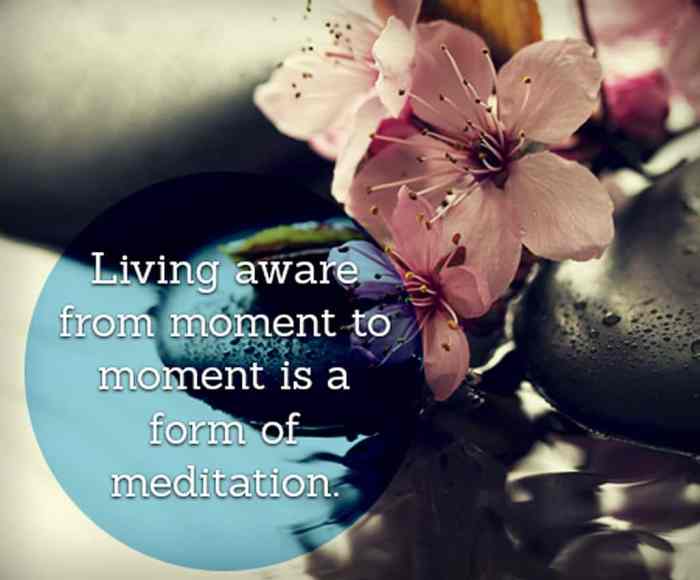
Meditation is like, super important when it comes to boosting self-control, you know? It’s all about training your mind to focus and be in the present moment, which can really help you resist temptations and make better decisions.
Good morning, my dear seekers of enlightenment. Today, let us explore the profound practice of meditation for enhancing your emotional awareness. By diving deep into your inner self, you can cultivate a greater understanding of your emotions and how they shape your reality. Learn more about How to Meditate for Enhancing Your Emotional Awareness and start your journey towards emotional intelligence.
Benefits of Meditation for Developing Self-Control
- Improves focus and concentration, making it easier to resist distractions and stay on track with your goals.
- Enhances emotional regulation, helping you manage stress and avoid impulsive reactions.
- Increases self-awareness, allowing you to recognize triggers that may lead to loss of control.
Examples of How Meditation Helps Improve Self-Control
- By practicing mindfulness meditation, individuals have reported decreased cravings for unhealthy foods, leading to better dietary choices.
- Regular meditation has been linked to reduced impulsivity, resulting in more thoughtful decision-making processes.
Understanding Self-Control and Its Importance: How To Meditate For Developing Better Self-Control
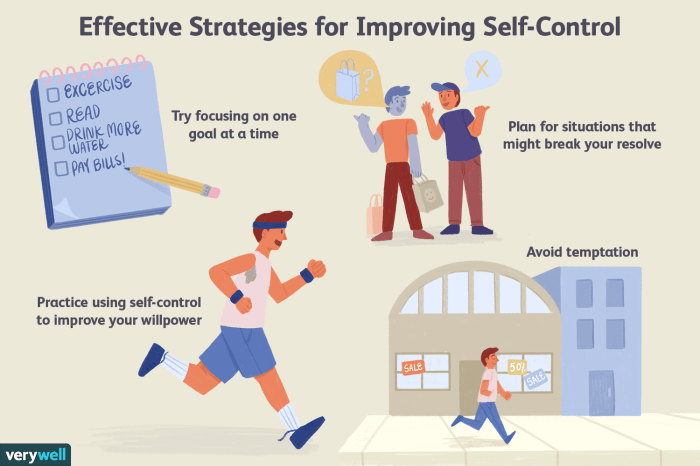
Self-control is the ability to regulate one’s thoughts, emotions, and behaviors in order to achieve long-term goals or resist impulses that may have negative consequences. It is a crucial skill in daily life as it helps individuals make better decisions, manage stress effectively, and maintain healthy relationships.
In the hustle and bustle of life, finding time for meditation can be a challenge. But fear not, for even busy individuals can benefit from a quick 10-minute meditation session. Unwind, relax, and center yourself with the 10-Minute Meditation for Busy People guide. Start your day with clarity and purpose.
Significance of Self-Control
Self-control plays a key role in various aspects of life, including personal development, academic and career success, and overall well-being. By developing self-control, individuals can improve their focus, resist temptations, and overcome obstacles that may hinder their progress.
- Self-control in decision-making: Having self-control allows individuals to think rationally and make informed choices, rather than acting impulsively based on emotions or immediate desires.
- Emotional regulation: Self-control helps in managing emotions effectively, reducing stress levels, and enhancing overall mental health.
- Interpersonal relationships: Developing self-control can lead to better communication skills, conflict resolution, and empathy towards others, resulting in healthier and more fulfilling relationships.
Techniques for Meditating to Improve Self-Control
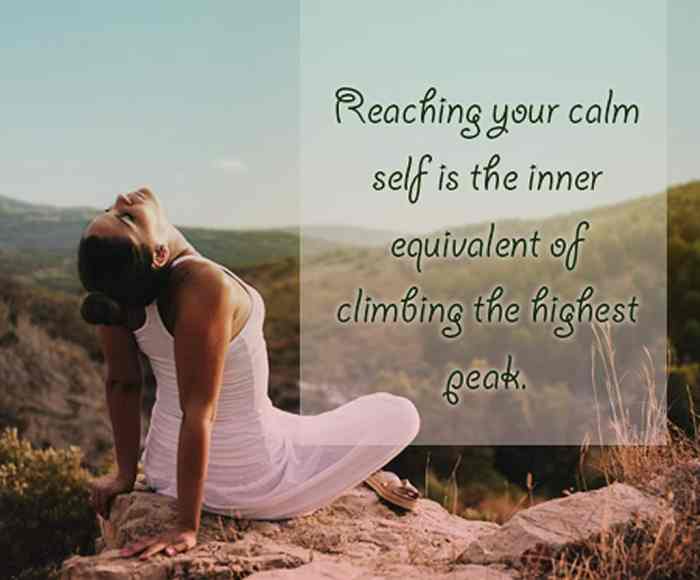
Meditation is a powerful tool that can help enhance self-control by calming the mind and increasing awareness of our thoughts and emotions. Here are some effective techniques that can be practiced to improve self-control:
Mindfulness Meditation
Mindfulness meditation involves focusing on the present moment without judgment, allowing you to observe your thoughts and feelings without reacting to them.
As the dawn breaks and the world awakens, let us also address the issue of anxiety and fear through the power of meditation. By grounding yourself in the present moment, you can reduce feelings of unease and worry. Discover effective techniques on How to Meditate for Reducing Feelings of Anxiety and Fear and reclaim your inner peace.
- Find a quiet place to sit or lie down comfortably.
- Focus on your breath or a specific sensation in your body.
- Notice when your mind starts to wander and gently bring your focus back to the present moment.
- Practice this regularly to increase your ability to stay present and make conscious choices.
Breathing Exercises
Deep breathing exercises can help improve focus and concentration, leading to better self-discipline and control over impulsive behaviors.
- Take slow, deep breaths in through your nose and out through your mouth.
- Focus on the sensation of the breath entering and leaving your body.
- Use this technique whenever you feel overwhelmed or tempted to react impulsively.
- Regular practice can enhance your ability to stay calm and make rational decisions.
Creating a Meditation Practice for Self-Control
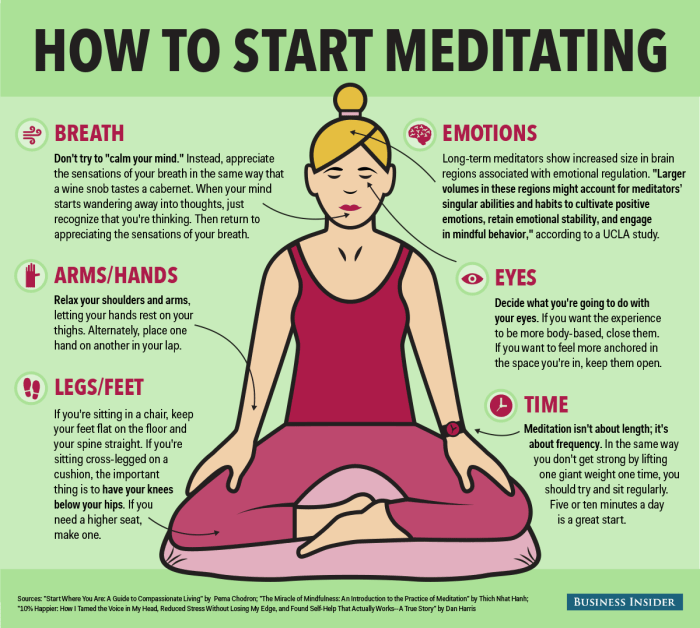
To start a meditation practice aimed at improving self-control, you need to follow a few key steps. Meditation can be a powerful tool in enhancing your ability to regulate your thoughts, emotions, and actions.
Setting Realistic Goals
- Start by setting achievable goals for your meditation practice. Whether it’s meditating for a few minutes each day or increasing the duration gradually, ensure your goals are realistic and manageable.
- Focus on improving your self-control gradually rather than expecting instant results. Consistency is key in developing this skill.
Consistency in Meditation
- Choose a specific time each day to meditate. Whether it’s in the morning before starting your day or in the evening before bedtime, consistency helps in making meditation a habit.
- Create a dedicated space for meditation. Find a quiet and peaceful environment where you can focus without distractions.
Ideal Time and Environment
- Early mornings or evenings are often considered ideal times for meditation, as your mind is usually more relaxed during these periods.
- Ensure your meditation space is comfortable and free from noise. You can use cushions or mats to create a cozy setting for your practice.
Challenges and Solutions in Meditating for Self-Control
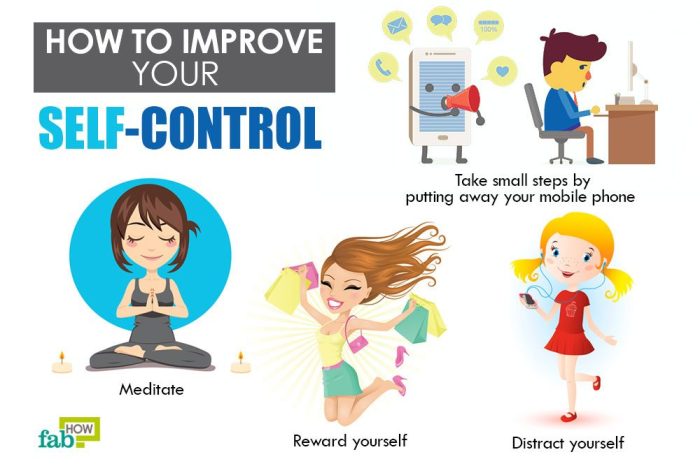
When trying to meditate for self-control, individuals may face various challenges that can hinder their progress. These challenges can range from lack of discipline to difficulty staying focused during meditation sessions. However, there are several solutions and strategies that can help overcome these obstacles and maintain a consistent meditation routine. In this section, we will explore common challenges and provide practical solutions to help individuals improve their self-control through meditation.
Challenge: Lack of Discipline
One common challenge when meditating for self-control is maintaining discipline and consistency in practicing meditation. It can be easy to skip sessions or lose motivation, especially when results are not immediately noticeable.
- Set a specific time each day for meditation to establish a routine and make it a priority.
- Start with shorter meditation sessions and gradually increase the duration as you build consistency.
- Use reminders or meditation apps to stay accountable and track your progress.
Challenge: Difficulty Staying Focused
Another challenge is maintaining focus during meditation, as the mind tends to wander and distractions can disrupt the practice.
- Practice mindfulness techniques to train your mind to stay present and aware during meditation.
- Acknowledge distractions without judgment and gently guide your focus back to the present moment.
- Experiment with different meditation styles to find what works best for you and keeps you engaged.
Challenge: Managing Stress and Anxiety, How to Meditate for Developing Better Self-Control
Stress and anxiety can make it challenging to meditate effectively for self-control, as these emotions can create mental barriers and hinder focus.
- Incorporate deep breathing exercises before meditation to calm the mind and reduce stress levels.
- Practice self-compassion and acceptance to cultivate a positive mindset and overcome negative emotions.
- Seek support from a meditation group or mentor to share experiences and receive guidance on managing stress during meditation.
Success Stories
Many individuals have successfully improved their self-control through regular meditation practice, despite facing various challenges along the way. By implementing strategies like setting a routine, practicing mindfulness, and seeking support, these individuals have experienced significant improvements in their ability to regulate their emotions and behavior.
“Meditation has helped me become more aware of my impulsive reactions and given me the tools to pause and make conscious choices in challenging situations.” – Sarah
“Through meditation, I have learned to cultivate patience and resilience, which has positively impacted my self-control in various aspects of my life.”John
In conclusion, How to Meditate for Developing Better Self-Control offers a roadmap to cultivating self-discipline through meditation, paving the way for a more balanced and centered life. Embrace the power of meditation to unlock your full potential and lead a more fulfilling existence.